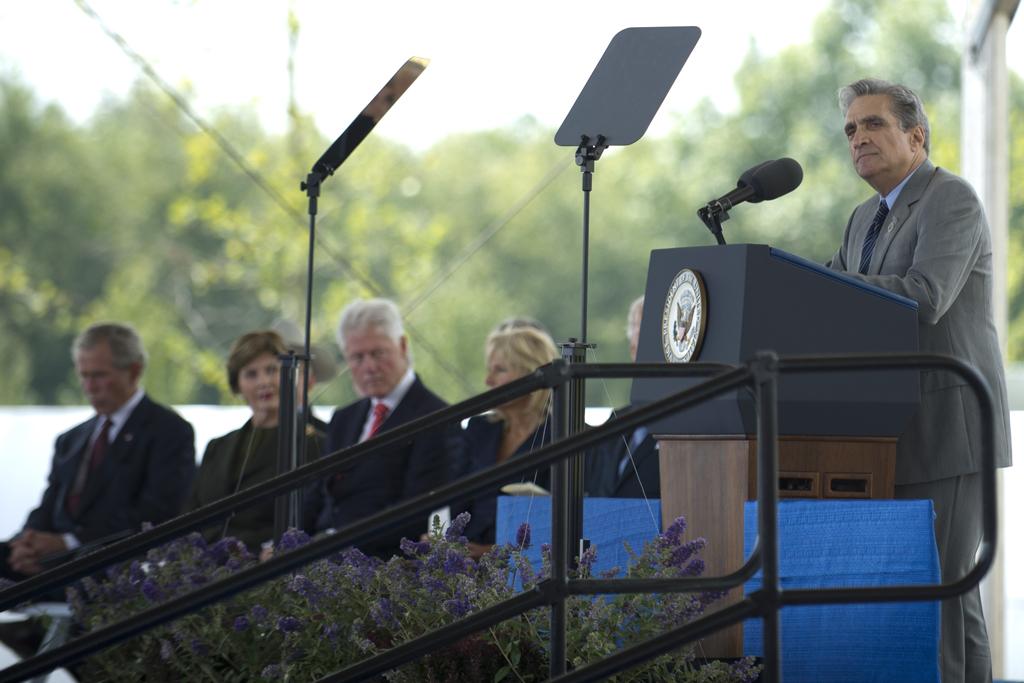Robert Pinsky, America’s poet laureate, goes to Israel
Poet Robert Pinsky reads during ceremonies at the Flight 93 Memorial on Sept. 10, 2011, in Shanksville, Pa.
JERUSALEM — As befitting a celebrated poet at the height of his powers, Robert Pinsky strides toward an interview in the company of a striking flame-haired woman in black.
At 72, Pinsky comes close to fulfilling Hollywood's fantasy of what a poet ought to look like: trim and fit, with a full head of steel-gray hair and a profile eerily reminiscent of another Massachusetts poet, Robert Lowell.
Only, he is not just a Massachusetts poet. A longtime resident of the Commonwealth and a professor at Boston University, he is the only man to have served as America's poet laureate for three terms.
In person as muscular and direct as in his verse, he clearly relishes the role of intellectual in the greater public sphere.
He was one of the first artists to tackle 9/11, in what rapidly became the canonical poem "The Forgetting," or, in other words, "memory of so much crap jumbled with so much that seems to matter."
Recalling a notorious post-9/11 reading by the then-state poet of his native New Jersey, Amiri Baraka, Pinski writes:
I was in the big tent when the guy read his poem about how the Jews
Were warned to get out of the Twin Towers before the planes hit.
The crowd was applauding and screaming, they were happy — it isn't
That they were anti-Semitic or anything. They just weren't listening.
Poetry is not an effete or remote exercise for this son of working class parents. Pinsky's proudest achievement as poet laureate is the site, www.favoritepoem.org, in which everyday Americans from every state in the union declaim their favorite poems — thus proving, for him, that poetry and the lives of regular people are inextricably intertwined.
He is the author of 19 books of poetry, but delights in mentioning his appearance with Sean Penn on a special 8-minute-long segment of comedian Stephen Colbert's show, in which he adjudicated a "Meta-Free-Phor-All."
"I loved it! I love comedy. I come from a family of joke-tellers," he said. "You had a serious actor, a great improv guy and I'm just an amateur ham … It was three ways of being funny."
The Colbert Report
Get More: Colbert Report Full Episodes,Political Humor & Satire Blog,Video Archive
While he doesn't "object" to being referred to as a Jewish poet, he finds adding an ethnic or religious tag to the work of an artist superfluous.
"It might interest other people," Pinsky said. "Not me. Writing is like trying not to drown in the ocean. You try side stroke, back stroke anything to stay afloat. You're not a Jew or an American. Trying to write a good poem is hard. It's a peculiar thing. You might die never having known if you wrote a good poem or not."
While rejecting the notion that poets may be wiser than other people — "they're just better at manipulating sounds and words" — he has straightforward advice for aspiring writers:
"Aspiring writers should read," he said. "You should keep a file called 'Anthology' and every time you find something you like, write it out and store it there. Know it."
He takes his own advice seriously: Appearing on stage in Jerusalem at Kissufim, a conference of Jewish writers, he recites his poems almost flawlessly from memory. Poetry, he said, "is on the spectrum between talking and singing."
In his poem "The City," he writes:
But lately I forget my neighbors' names.
More and more I spend my days in the City:
The great metropolis where I can hope
To glimpse great spirits as they cross the street
Souls durable as the cockroach and the lungfish.
And whatever his show biz proclivities, Pinsky, who has translated Dante's Divine Comedy into English, counsels rigor.
Canonical texts do not become canonical "because they're assigned," he said. "They become canonical because they are great. Read them."
But back to politics, and to the lady in black.
When people ask him if poetry has any effect on the world, he responds "have you ever heard of the Quran?"
He is a supporter of US President Barack Obama and gave then-presidential candidate Al Gore a hand with speechwriting. President George W. Bush, he said, "made other jerks look good — No! Don't quote that! Oh, ok, quote it, it's OK. I've been indiscreet."
He demurs when asked what he might say to President Obama, expressing a preference for meeting him when he’ll be out of office and free from "talking from note cards."
The elegant woman who accompanied Pinsky in Jerusalem, Tal Nitzan, a prominent Israeli poet and translator, interposes, "I know what I'd say to Obama, as an Israeli."
"I'd tell him AIPAC [American Israel Political Action Committee] causes the greatest damage and danger to Israel," Nitzan said. "I'd tell him, 'please stop listening to them. They have us stuck in an eternal state of war.'"
She may not be referring to the lobbying group as much as to the "well-meaning but misguided American Jews" — mostly doctors and lawyers, whom Pinsky used to join for poker games — "who are not convincing about their conviction that Obama is not good for Israel."
He hopes the visit to Israel planned by Obama "who is not perfect but sensible, will bring them to their senses."
Every day, reporters and producers at The World are hard at work bringing you human-centered news from across the globe. But we can’t do it without you. We need your support to ensure we can continue this work for another year.
Make a gift today, and you’ll help us unlock a matching gift of $67,000!
